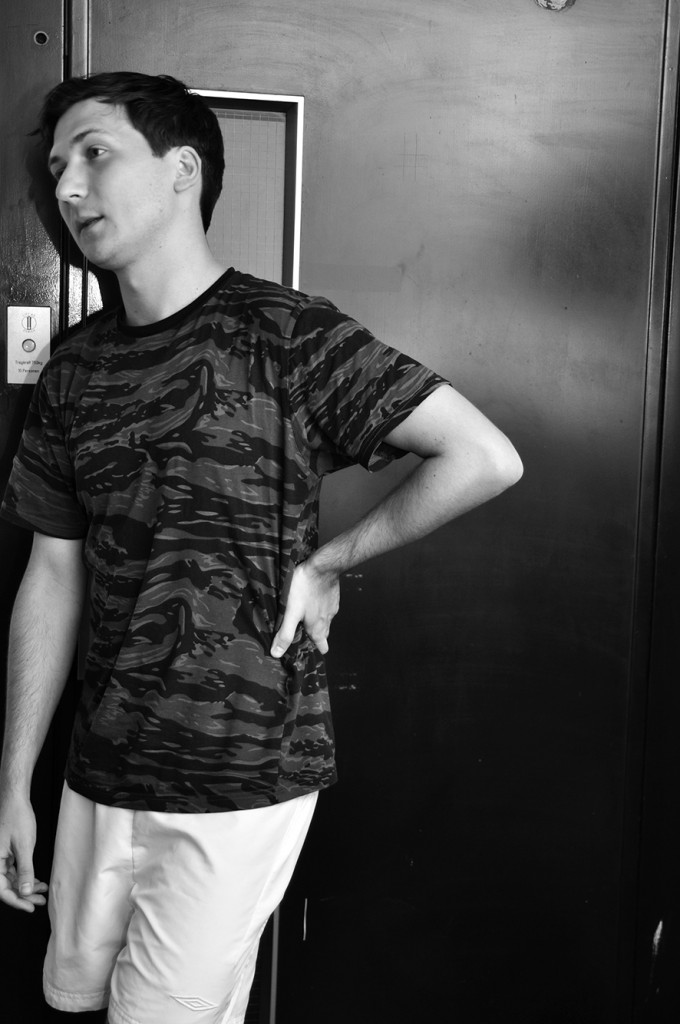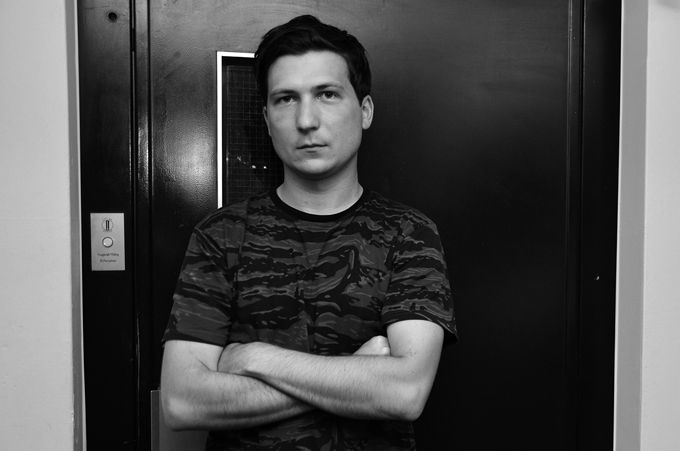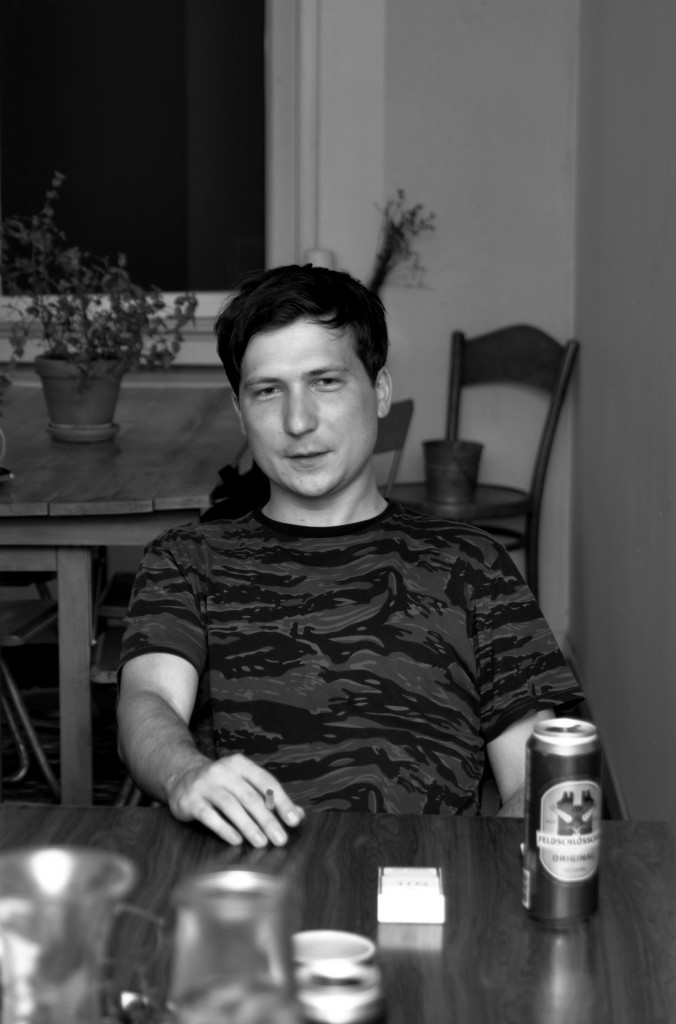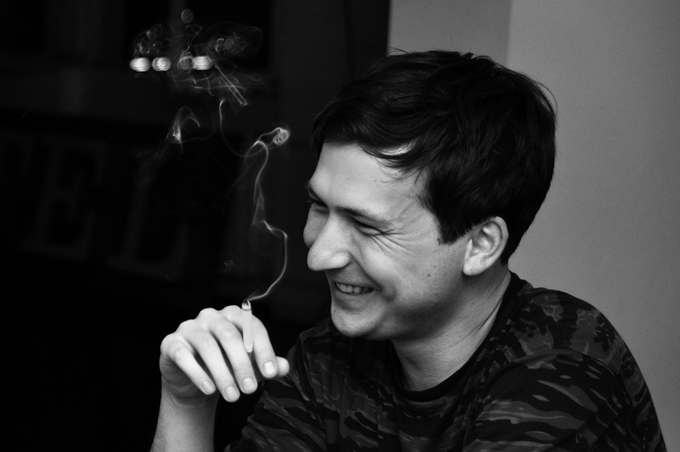The aforementioned diversity of styles and references shaping M.E.S.H.’s DJ sets can also be found in an abstracted form on his debut for Bill Kouligas’s label PAN, which followed several releases on Dyssembler and Black Ocean. The EP Scynthians fuses elements of hardstyle, Jersey club, and grime into aggregate constructs whose subtle and elaborate character distinguishes the EP from the work of albeit similarly minded artists who make more minimalist and functional club music. The carefully melded tracks are united in their somber, murky dispositions and collectively impress as an atmospherically dense, coherent whole. What’s more, their titles seem to hint at a consistent nomadic, anti-imperialistic quality in the music’s various and amalgamated marginal or marginalized stylistic influences. One is, in fact, tempted to investigate further, to inquire into the sources of what seems like a common thread. Marc Schwegler was unable to coax out any such information in his interview with M.E.S.H. in Zurich after the artist’s guest DJ set in the Longstreet Bar; instead, questions of space and self-organization were the order of the day. On the same occasion, James was photographed by Judith Blum.
Marc Schwegler Would you identify yourself as a musician, producer, or DJ? Do these terms carry any weight in the context of what you do?
James Whipple I definitely wouldn’t identify myself as a musician because I don’t play an instrument – I only played bass when I was about 14. Of the terms you mentioned, “producer” fits best. I started producing long before I began to DJ. When I DJ, I play a lot of my own tracks or edits. The way in which I mix is also somewhat special, but it’s still easiest to label it as DJing. In any case, though, I invest much more time in producing than in DJing.
MS Which music styles interest you as a DJ?
JW I can’t concentrate exclusively on a particular style as a DJ and be happy with the outcome. When I search for music that I’d like to play, I always have my eye out for particular qualities that work independent of a track’s classification in a certain genre. For example, I’ll look for something with relatively minimal percussion. That could end up being techno or rap or whatever. I am most interested in how things are produced and less so in the associated scene or similar correlations. I find other criteria to be more important.
MS The art and fashion magazine 032c named its interview with you and the other creators of Janus, the Berlin club night, “Searching for a Sound that Doesn’t Exist”…
JW Yeah, exactly. My last EP on PAN isn’t exactly uniform rhythmically, for example, but I hope that there are coherences in the sound palette, tonality, or spatial aspects. Every time I begin a new track I start from scratch. I can’t bring myself to produce more than one track in the same way. I look for a sound I like and follow where that sound takes me. I’m not the sort of producer that says to himself, “Ok, I’ll make my club record now – it should sound like this and this”; I wish I could do that! Instead I feel like an infant when I start something new. That might sound exaggerated, but I really have to start fresh every time and feel my way through the new sounds.
MS How would you describe your production style? Do you focus on a certain compositional form? Are the tracks montages, or more collages?
JW Collages, definitely. I think a lot about the tracks’ spatial qualities. Instead of beginning with the core rhythmic elements, I often begin with a limited section and mix in field recordings and find the right reverb, in order to define a kind of context for the track at large. After that, the drums continuously change over the course of the next couple of hours of work and develop in a completely unanticipated direction. But they remain a part of this original setting or atmosphere.
MS Do you think about how and where the tracks should be played?
JW Yeah, of course. But the practical aspects influence a lot: I’m often traveling and seldom have an ideal setup for producing. Lately I’ve been working with headphones. For the Janus night, though, we had a residence at Chester’s in Berlin. I produced tracks especially for that sound system, because I could always get there earlier and test the levels. The sound system there definitely influenced the way in which I produce.
MS Do you think that there’s generally a connection between producing and intended or imagined sound system?
JW For sure, especially in my case. I come from a music culture in which having high-end audio equipment isn’t really a priority. I went to school in New York and a lot of the parties I went to there took place in apartments or in the back of bars. People didn’t pay much attention to the sound quality. Now I live in Berlin, where there are clubs that have invested lots of money in their infrastructure since the nineties, partly because people have expected it. That really changed the way I listen to music. I had been used to hearing club music more hypothetically, on headphones in the train, for example. But to live in a city in which even the average club down the street has a good sound system… of course not all of the clubs are like that, but just to be constantly exposed to how good equipment can sound leads you to want to operate within that framework. You start to think more texturally and to produce with that in mind.
MS Dan de Norch, one of the founders of the Janus night, expressed in the aforementioned 032c interview that today sees a lot of “homeless” club music. Producers and DJs who don’t have residencies at clubs produce tracks more theoretically – tracks that “people could dance to somewhere.” [032c, Searching for a Sound that Doesn’t Exist, Issue #26]
JW Yeah, that’s a result of the fact that there are tons of people who produce music at their parents’ place somewhere in the English countryside, for example. They’re not necessarily tied to an urban club music scene with which they might be able to interact. Along with that, there’s such a massive variety of micro-genres in dance music that are referenced on Internet forums or YouTube channels. At the moment, for example, there are uncountable, extremely focused Facebook groups whose members post things according to nebulous criteria. That phenomenon also has an abstracted element – there isn’t necessarily a corresponding scene in the real world out of which might grow a corresponding label.
MS Has dance music’s virtual, hypothetical character also given birth to new possibilities? In other words, does it allow for or inspire increasing experimentation?
JW I find it really interesting what’s happening at the moment. Take, for example, the current instrumental grime craze: formally, there’s a large extent to which the surge in production has an experimental character. It also seems as though there’s a corresponding appetite for that music. In spite of the hype in music magazines, though, that appetite shows itself in only very small dimensions. Nevertheless, if one of the criteria of experimental club music is specified as its finding adventurous new forms, then this new music is certain to be qualified that way. When you look, for example, at Mumdance: although the tracks are all very well produced, well-suited for mixing, and fun to play, they all on the other hand have a unique internal logic, an experimental twist. So it’s suddenly becoming difficult to place things in traditional categories.
MS For sure. But do these tracks have an impact in clubs themselves? Do you actually hear them played?
JW That’s the big question. The magnitude of press attention we’ve received for our Janus series has been astounding. Especially at the beginning but even up till now we’ve worked completely outside of the traditional clubs. We had no chance against the gigantic mainstream industry that generates millions of euros annually, and even the press we’ve received is a relative drop in the bucket. None of the Berlin party tourists will get led astray and end up at our parties. Or maybe a few will, but still. As do so many initiatives, we have a lot of trust in what we do – we believe in ourselves and in our friends and that generates a point of departure. So it’s hard to say whether it will all have a larger influence.
MS The boundaries between underground and mainstream, between entertainment and experiment, between pop and art seem to be becoming less and less valid. Often the categories remain clearly distinguishable from one another, but it’s increasingly possible to bring the spheres closer together. Would you agree?
JW I grew up without really being a part of dance music culture – I was never involved in a techno or house scene. In the states, most clubs play top 40’s: hip hop and R&B. So that’s my default setting as a DJ. This isn’t necessarily a populist approach to a party – more a functional one. I personally don’t think much about how to bring popular and experimental music together – I just like both. Lately there’s a huge number of eclectic DJs who mix lots of different styles, and I don’t think that’s either necessarily a good thing or that it’s a new development. It really depends on the individual approach people take.
MS Do new sounds and new DJing techniques lead to a changed practice?
JW Well in relation to technology, I think so. About five years ago, when Traktor and Serato appeared on the market, people would arrive with all these controllers. Now the Pioneer CDJ 2000 is replacing those other programs as the industry standard. It can do everything that Traktor and Serato can, but more easily. For me personally this was a big enlightenment – it’s made it much easier to play around and try things out. As far as the technical side of DJing goes, I’m not particularly advanced. I often just fool around with the CDJs and sometimes it sounds good. It’s just really super easy to make these microsecond loops and add filters and effects – it just expands the possibilities.
MS For you, what’s an adequate setting in which to present music? Do you imagine an ideal space or environment?
JW We put on the Janus night at Chester’s in Berlin. Chester’s opened in the nineties as Kitkatclub and has had many different lives. We somehow felt an affinity for the setup and architecture there. For example, there’s a pompous DJ booth you reach via a small staircase and from which you look over the whole crowd, and then there’s a darkroom with a platform-like balcony… the architecture has a slightly twisted quality. When you have a good space for a party or when you have someone who really devotes himself to taking care of the sound, it can change every- thing – that’s all really important. But lately I’ve been thinking a lot about space because I’m working on an installation for the Hamburger Kunsthalle. I’m adapting the title track of the EP. It’ll be my first multi-channel sound installation.
MS The club still interests you, though, despite the fact that you’ve begun to do installation work?
JW I completely understand why many people are bored of clubs. But I’m not, yet. I like to go out and meet people I know in an interesting space. I like the dramaturgy of clubs, the door politics, the entrance ritual, the theatricality of the whole thing. It’s great when clubs are unpretentious but operate premeditatedly and deliberately and thus still shape people’s perception of their experiences there. That’s interesting. Maybe someday I’ll be bored by all that and will refuse to do anything but sound sculptures on beaches or something. [Laughs]
MS You once said that you have a very lazy, neurotic way of working…
JW I just have a very inconsistent, changeable personality. I spend more time thinking about work than actually working. I make lots of different versions of things, record a lot, combine the individual tracks, separate them again. My way of working is to generate a lot of confusion and then let that ferment. It’s a very chaotic, erratic process.
MS Do you feel pressure to change that?
JW Hmm. Well there are these blogs that are designed to help you organize your life – Lifehacker, for example. I studied design and in many ways work as I would as a freelance programmer. When you produce, you sit in your apartment and work with software, so you have similar routines and habits to programmers. Sometimes when I’m frustrated, I think to myself, “Ok, I need a new to-do list app,” and then it takes me four hours to find a to-do list app. So that doesn’t help. I respect people who have self-discipline.
MS Does your chaotic, erratic working style have its benefits?
JW I think some things are just hard-wired in us and almost impossible to change.
MS True. These apps also never really worked for me…
JW Yeah, although there are a ton of them. Getting Things Done is one of the most well known, or this book by Tim Ferris, The 4-Hour Work Week. It’s an online movement led by autistic libertarians in which it’s suggested to work only four hours a week and order a personal secretary in the Philippines to take your phone calls while you’re on vacation in Bali. I just find that shit funny. The mere fact that there are people who have control over the tons of crazy little plans in their lives – that’s probably evolved because of freelancing. Maybe it’s stupid to talk about business practices in a music interview, but there isn’t anything much more interesting than how people organize their lives. But it’s also not bad to have the day ahead of you and have to make something out of that.
MS Productivity has become one of our society’s central paradigms. Today’s technology, designed in large part for self-optimization, intensifies the widespread compulsion to be productive. Sometimes I wonder if there could be a different approach, if the self-optimization tick could be turned off from time to time.
JW For my last EP I made three tracks in one day. For the title track, though, I needed four months. Either I manage to complete things in a couple of days or it takes me forever. For my newest track, for example, I finally had time in a studio, so I made mixdown after mixdown and tried to get everything sounding clear and to optimally situate the sound spatially – either I’m super focused or I try something once and then throw it away. I constantly switch between these two approaches, between autism and laziness, so to speak.

